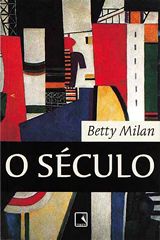
excerpt
THE CITY: The skyscraper is a vertical ghetto. Paul Virilio
WAR: If Brazil wishes to enter the club of great nations, it must become a nuclear power. Pierre-Marie Gallois
THE EARTH: World climate does not depend on what happens in the Amazon but on the sharing of land and sea. Pierre Gourou
EXILE: … only the West welcomes immigrants. Gérard Chaliand
LIFE: I don’t believe we will exceed 100, 110 years, but it’s possible that at 100 we can have sex like at 20. François Jacob
WOMEN: Freedom has a price, and men tend to run away from great women. Michèle Sarde
SEX: Sexual freedom doesn’t exist. Either we are subject to prohibitions or to the imperative to have sex. Catherine Millot
LANGUAGE: The Americanization of Brazilians is an insult to Latin-ness. Claude Hagège
ART: Baudrillard is right: contemporary art is nonexistent. Georges Mathieu
COMUNICAÇATION: The principal function of the media is to establish social linkage. Dominique Wolton
synopsis
What was the twentieth century? The author answers this question through use of the interview. The ten themes in the book are: the city, war, the earth, exile, life, women, sex, language, art, and communication. And ten interviewees, selected from among the greatest European specialists in the topics.
Thus, urbanist Paul Virilio describes the deterioration of the planet’s great cities. General
Pierre-Marie Gallois focuses on the world’s geostrategic unbalance. Geographer Pierre Gourou reflects on the depopulation of the countryside and hunger. Gérard Chaliand, sociologist and political scientist, reveals the limits of contemporary racial amalgamation. Nobel laureate François Jacob talks about progress in molecular biology and his reflections on preventing cancer. Writer Michèle Sarde analyzes women’s grand unsung battle in the social arena. Psychoanalyst Catherine Millot examines sexuality, which she compares to totalitarian parties. Linguist Claude Hagège deals with the role of globalization in the disappearance of languages. Painter Georges Mathieu (letter) speaks of the massacre of sensitivity at the end of the millennium, and communication scholar Dominique Wolton explains why the central question of the twenty-first century will be communication.
history
O século brings together interviews by Betty Milan published in the newspaper Folha de S. Paulo from 1997 to 1999.
APCA Prize for 1999.
opinion
“Betty Milan investigates this century by making use of the interview, a method she commands in exemplary fashion by not competing with the interviewee and thus constructing an enlightening dialogue with him.”
Alain Mangin, preface to the book.
“Congratulations on the impressive set of interviews, of great literary and historiographic interest.”
Otavio Frias Filho, letter, August 23,1999
“In O século, Betty Milan interrogates the world, utilizing the intermediation of specialists. The constant probing, the expression of critical sense, is a literary activity par excellence. Which also results in journalism of quality.”
Claudio Willer, flaps of the book
areas of interest
Communications Studies, as a component of the new journalism; Literary Studies, because of the numerous authors and intellectuals interviewed and the exchanges dealing with literary criticism.


